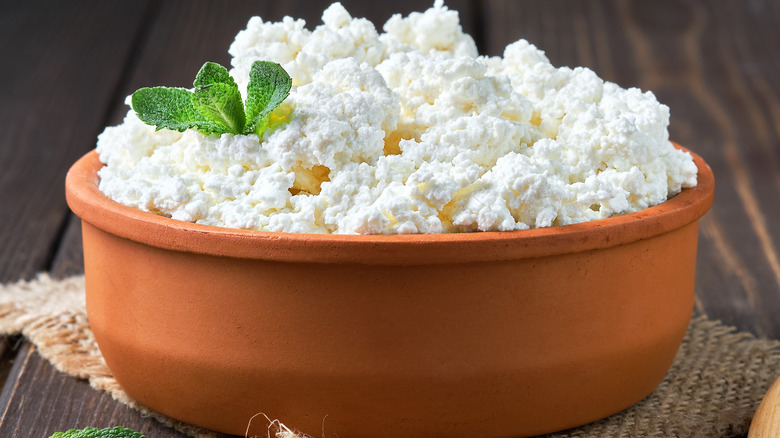Is Cottage Cheese Good For You?
When it comes to cottage cheese's mild flavor and creamy texture, people are often firmly in the "love it" or "hate it" camp. While it's still popular among athletes and those who are working hard to stick to exercise goals, its popularity in recent decades among the general public has given way to a newer protein-packed powerhouse: Greek yogurt. Considering the similar nutritional profiles of cottage cheese and Greek yogurt — with cottage cheese leading in protein, and Greek yogurt edging ahead in calcium and lower sodium — maybe cottage cheese actually deserves a little more love.
"Everything comes around full circle, and it's time for cottage cheese to get its day," Debbie Petitpain, wellness director at the Medical University of South Carolina and spokesperson for the Academy of Nutrition and Dietetics, told Consumer Reports.
Cottage cheese is relatively low in calories and super high protein, with 28 grams per cup, making it a favorite bedtime snack of athletes who are trying to build muscle mass. Most of the protein is in the form of casein, which is slowly absorbed and promotes muscle growth and repair (via WebMD). Cottage cheese is also an excellent source of several vitamins and minerals — most notably calcium, vitamin B12, and selenium — making it a nutrient-dense food (via Healthline).
What you should know about cottage cheese
With so many things in its favor, what's not to love about cottage cheese? Well, the sodium content, for one. According to Consumer Reports, cottage cheese can easily contain 300 to 400 grams of sodium per half-cup serving, although "low-sodium" and "no salt added" options are now available. Also, cottage cheese will likely not be an option for those who have a dairy allergy. However, lactose-free cottage cheese options do exist for those who are lactose-intolerant.
All in all, cottage cheese is a nutrient-packed food that deserves a place in health-conscious diets. Cottage cheese is a "fresh" cheese, meaning that it doesn't go through an aging process, unlike many other kinds of cheese. This means it has a mild flavor, which gives it a lot of versatility in food preparation. It can be enjoyed fresh, with a sprinkling of herbs or fruit, or it can be used in pasta dishes, pancake recipes, and more.
It's not pretentious, but that's also part of its appeal. "A single-ingredient food doesn't have much opportunity to reinvent itself to become sexy," Debbie Petitpain adds. "But the health benefit comes in the simplicity itself."
Cottage cheese has other potential health benefits
The health benefits of eating cottage cheese go beyond building muscle mass, however. Cottage cheese harbors 251 milligrams of calcium, reports Medical News Today. Not only does calcium help our teeth and bones grow strong and healthy, but it also helps protect against related health conditions such as osteoporosis. Additionally, all that calcium may help lower one's blood pressure for people with hypertension, as calcium supports the health of our blood vessels, according to MedicineNet. That is, as long as you stick with low-fat or fat-free cottage cheese options.
Alternatively, those who consume brands of cottage cheese that also serve as a probiotic may be supporting the health of their gut microbiome, according to Medical News Today. But perhaps cottage cheese's most notable superpower is that it may help reduce one's risk for certain cancers. A 2002 study published in the Journal of the National Cancer Institute found that premenopausal women who consumed greater amounts of low-fat dairy foods, including cottage cheese, stood at a lower risk for developing breast cancer.
Is it healthy to eat cottage cheese every day?
As with most things, moderation is key, and the same is true when it comes to cottage cheese. While it's not recommended to make cottage cheese your sole source of nutrition throughout the day, Prevention reports that there's no harm in enjoying one daily serving of cottage cheese — as long as you don't have any dairy sensitivities.
So when is the best time of day to snack on a little cottage cheese? Researchers from a 2018 study published in the British Journal of Nutrition looked at how eating cottage cheese affected metabolic rate and muscle recovery in active young women when eaten a half-hour or full hour before going to sleep. Study findings showed that eating 30 grams of protein a half-hour before heading to bed yielded the greatest health benefits in terms of muscle quality, metabolism, and general health in participants. So the next time you're craving a midnight snack, perhaps reach for some cottage cheese and remember the 30 rule: 30 grams of protein within 30 minutes of bedtime.




